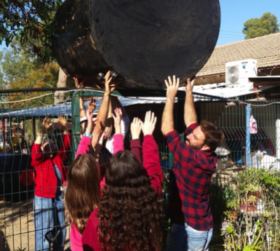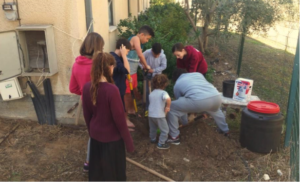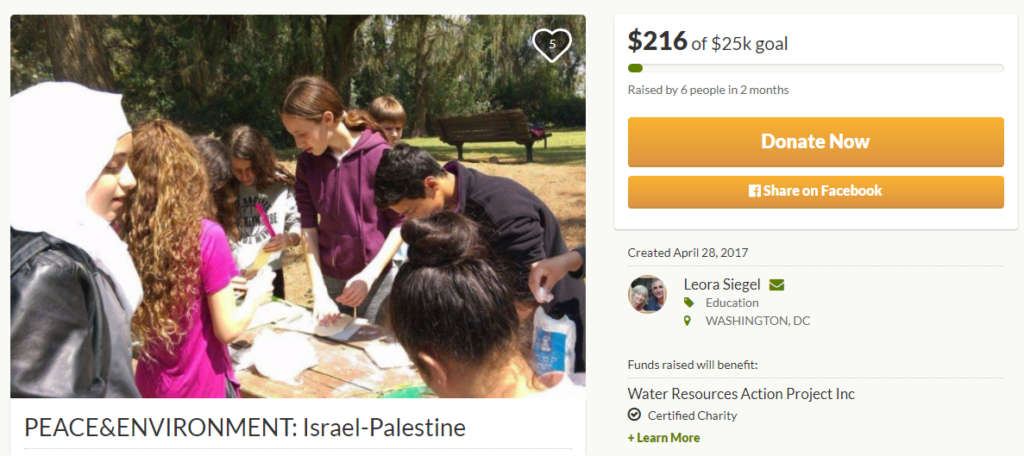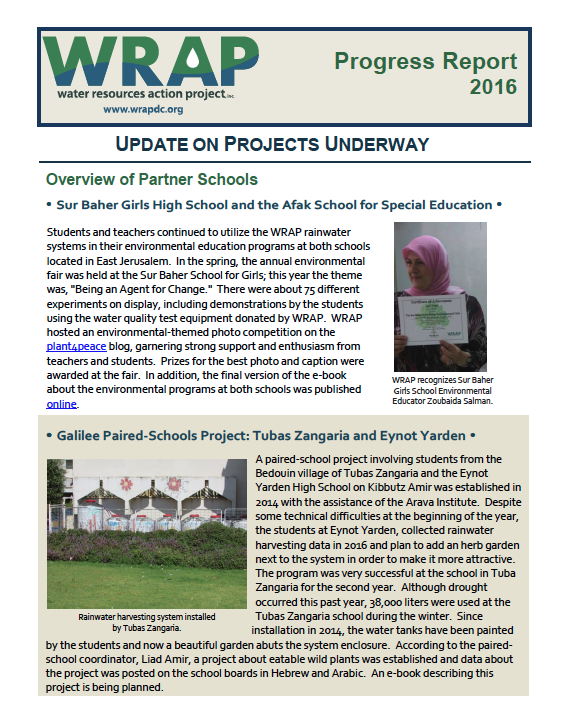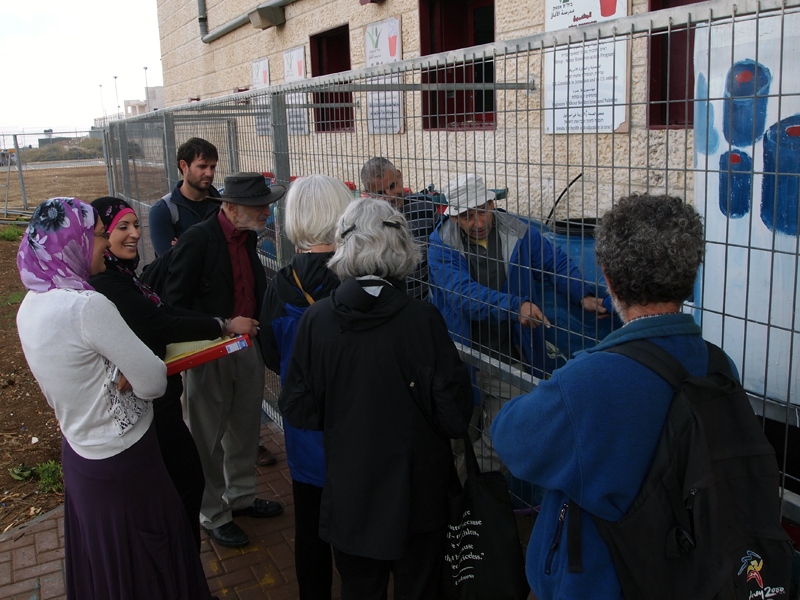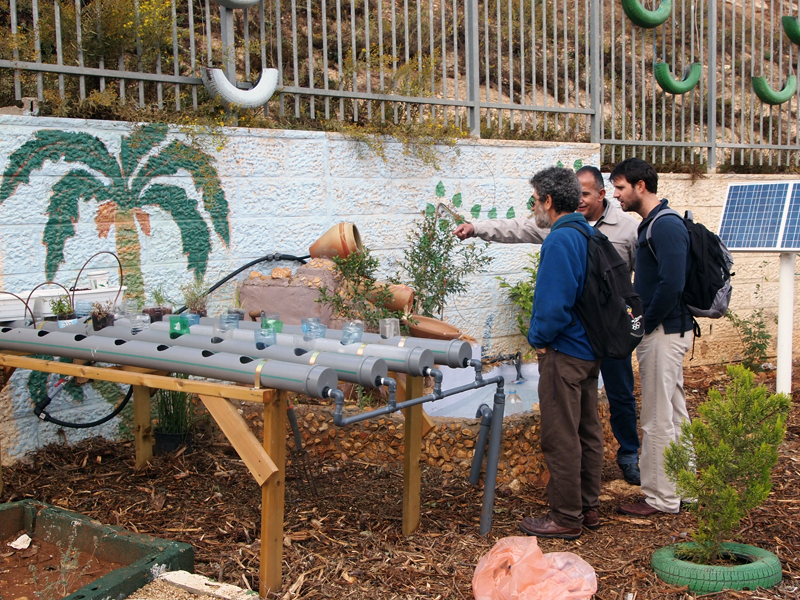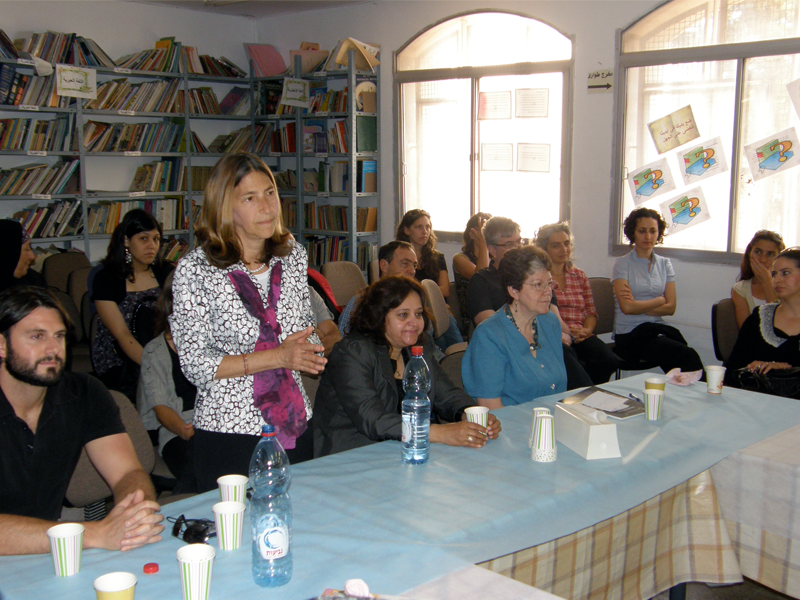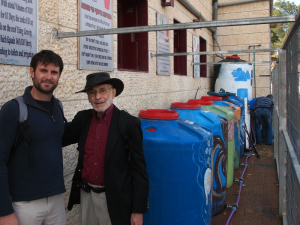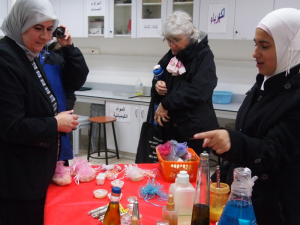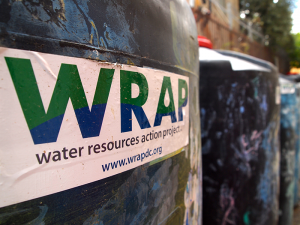Malcolm Siegel, PhD, MPH
Director of Education and Operations
Water Resource Action Project, Inc.
The first few weeks of May 2018, were a stressful period, characterized by events that seemed to threaten the stability of the Middle East. Many rejoiced in the 70th Israeli Independence Day and the relocation of the US Embassy to Jerusalem. However, the potential for armed conflict with Iran at the Israeli- Syrian border, the bloody protests at the border with Gaza and the fear that the relocation of the Embassy would ignite unrest in the West Bank led many to despair that prospects for peace between Israel and the Palestinians were dimmer than ever. During this same period, my wife, Leora and I embarked on an environmental peacebuilding trip sponsored by the Water Resources Action Project, one of the organizations supported by the Environmental Peacebuilding Fund of the Jewish Community Foundation of New Mexico.
Environmental peacebuilding promotes peace in areas of conflict by finding a common ground to solve environmental issues that affect all people in the region. In many parts of the Middle East, people struggle to find agreement over water use, due to environmental, political and cultural differences. By turning the shared challenges with freshwater supply into opportunities for cooperative environmental projects, trustful relationships with people from diverse backgrounds can be built.
The Water Resources Action Project (WRAP) brings water harvesting systems, environmental education, and cross-cultural exchanges to K-12 students in Israel, Palestine, Jordan and the US. Arab and Jewish students get to know “the other” and begin to build trusting relationships as they work on common environmental issues and share their stories in person and on-line. In the past seven years, we have built water harvesting systems in a network of nine elementary middle and high schools in Israel, East Jerusalem, the West Bank, and Jordan.
The 2018 Environmental Peacebuilding Project Tour lasted from May 1 to May 13, 2018. During this time, we held an environmental education workshop attended by 20 educators from 9 Arab and Jewish schools in Israel. We visited 5 sites where WRAP rainwater systems have been installed, visited three additional schools that wish to join the WRAP network, and met with representatives from four additional schools in Israel and Jordan that would also like to join WRAP. We attended Environmental Fairs where WRAP had made significant contributions and gave awards to students that had competed in the 2018 WRAP Environmental Photo contest. Some excerpts from our trip report follow.
MAY 3, 2018, WRAP TEACHERS WORKSHOP – KIBBUTZ GEZER, ISRAEL.
On May 3, 2018 the first WRAP Workshop was held at Kibbutz Gezer, involving 20 educators and four students from nine schools (Hebrew and Arabic). WRAP engineer and Israel’s “Water Harvesting Guru” Amir Yechieli shared information about the water harvesting systems that he has installed throughout the world. I described an international student citizens science project, the EarthEcho Water Challenge. Educators were enthusiastic about participating in the 2018 Fall semester and received water testing equipment for additional tests beyond the standard EarthEcho tests. The students from Sur Baher Girls School in East Jerusalem made an English presentation about the science projects at their school. This was not their first visit to Kibbutz Gezer. Students from Sur Baher are connected to students at Kibbutz Gezer in Israel and students at the Albuquerque Academy on the multi- lingual plant4peace blog. This year, students from Sur Baher have already made two visits to the students at Kibbutz Gezer.
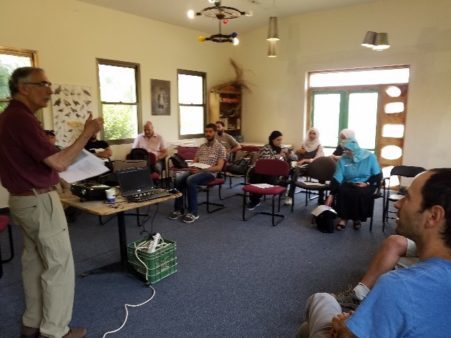
Malcolm Siegel describes the EarthEcho water Challenge
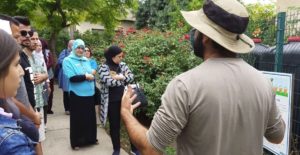
The Kibbutz Gezer gardener describes rain water harvesting system
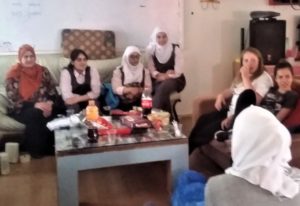
Teacher Zoubaida Salman and students present results of projects at Sur Baher
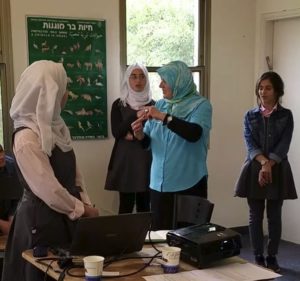
Arab students from Sur Baher meet with Jewish students from Kibbutz Gezer earlier in the year
MAY 9, 2018, SUR BAHER GIRLS SCHOOL, ENVIRONMENTAL FAIR
At the invitation of Zoubaida Salman, our contact at Sur Baher, we attended their annual environmental fair, where students filled the school with posters, experiments and demonstrations of their science projects. Ms. Salman is an effective advocate for encouraging young Arab girls to get excited about science and technology. Students from her environmental club visit science labs and attend lectures at local universities. The harvested rainwater from the WRAP system at Sur Baher is used in restrooms and in an herb garden. The students process the herbs to make personal care products such as soaps that they sell to their community and at Kibbutz Gezer. Leora presented an award to a student who won the WRAP environmental photo competition and Malcolm presented an award to the school principal for participation in the WRAP program.
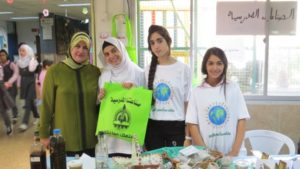
Zoubaida Salman and students
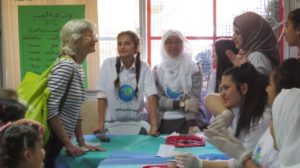
Leora Siegel and students discussing an anatomy project
MAY 10, 2018: VISIT TO A-TUR SCHOOL, EAST JERUSALEM
Batool Salman is a science teacher who works part time as an education consultant for the Israel Ministry of Education. She invited us to the Science Fair Day at an Arab school in A Tur and gave us a tour of the school’s facilities. The school has a very large rain water catchment cistern (dating from the Romans) that is being placed into service. Batool hopes that the school can join the WRAP educational network; she would like assistance in purchasing a weather station, flow meters, solar energy panels and chemical test equipment.
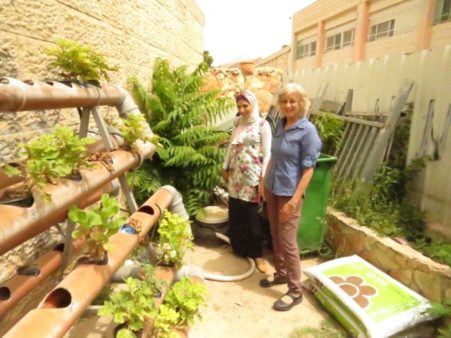
Leora Siegel and Batool Salman in school hydroponics garden
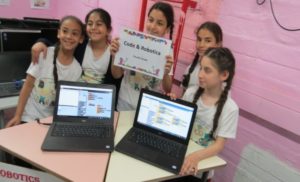
Students displaying their robotics project
FINAL COMMENTS – WE ARE NOT ALONE
WRAP is a member of the Alliance for Middle East Peace (ALLMPEP), a consortium of over 110 organizations focused on facilitating people-to-people interactions involving Jews and Arabs in Israel and Palestine. At our workshop at Kibbutz Gezer, Doubie Schwartz, the ALLMEP regional coordinator told us that he estimates that 10,000 people, “10,000 points of light”, are now involved in their programs. Working together on common environmental issues allows Palestinians and Israelis to learn about each other and avoid focusing on conflicting historical narratives and controversial government policies. As Tom Friedman of the New York Times wrote about the Kidron Valley/Wadi Nar Master Plan (another joint Israeli-Palestinian environmental project supported by the Environmental Peacebuilding Fund): “It’s relationships of trust between neighbors, that create healthy interdependencies — ecological and political. They are the hardest things to build, but also the hardest things to break once in place.”
POST SCRIPT: MAY 15, 2018.
WRAP has also installed rainwater systems at two sites in Northern Israel: the Bedouin village of Tuba Zangaria and Kibbutz Amir. WRAP provides funds for joint field trips for students from the two schools. After we returned from Israel, we received the following note and pictures from Liad Amir, our local coordinator, about their second field trip this year:
“16 students and 2 teachers from the Bedouin School in Tuba Zangaria came to visit the Eynot Yarden Kibbutz School. We drank herbal tea and cookies, did a tour in the school, visited the water harvesting system and came back to the environmental area (greenhouse) to make small signs in Hebrew and Arabic for the fruit trees and for the plants in the herbal. It was a ray of light next to the darkness in the rest of our country… “
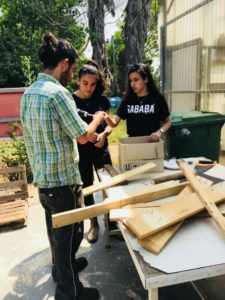
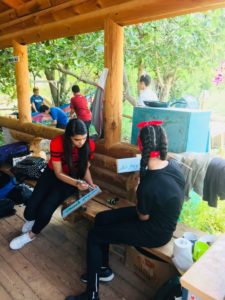
Students from the Bedouin village of Tuba Zangaria and Kibbutz Amir work together on environmental projects sponsored by the Water Resources Action Project and the Environmental Peacebuilding Fund of the Jewish Community Foundation of New Mexico.

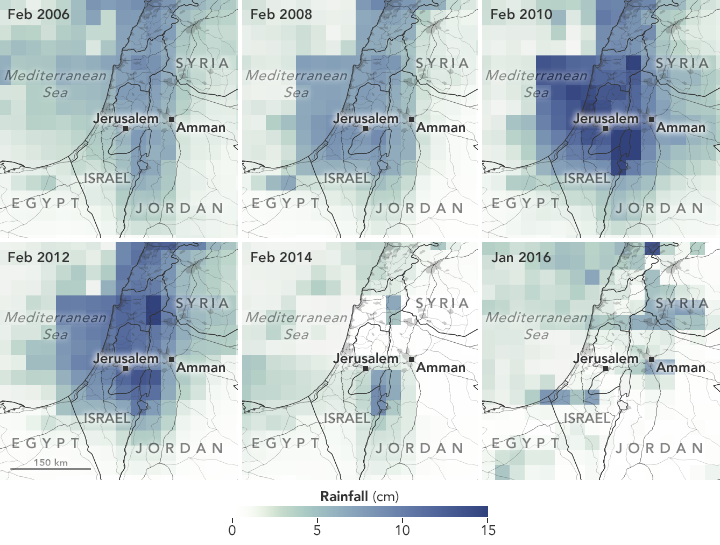
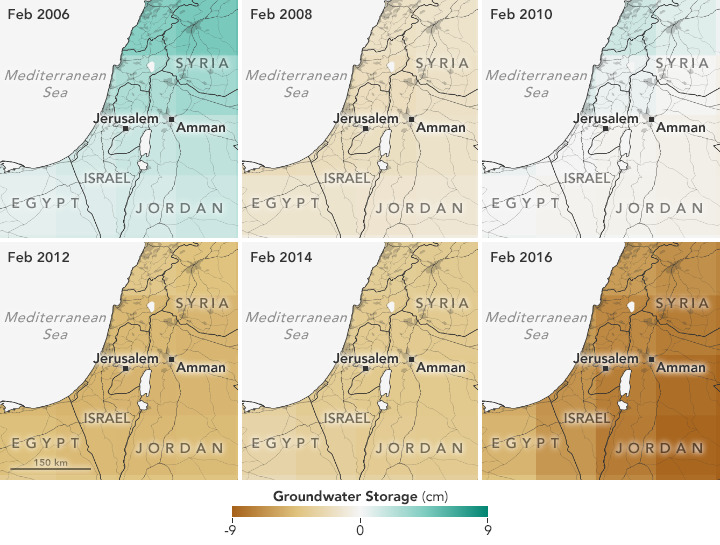










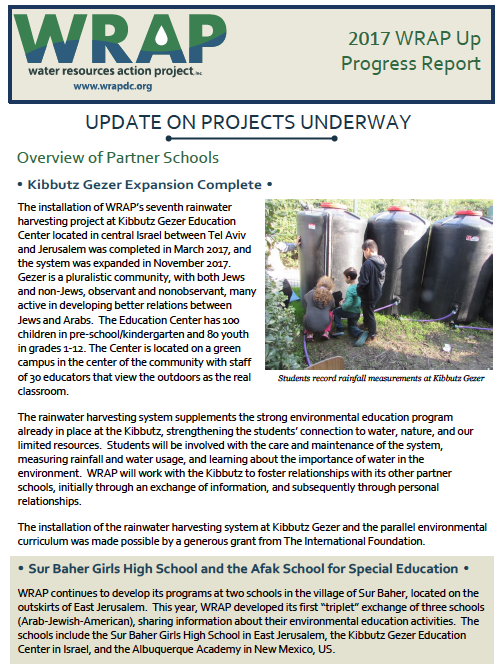
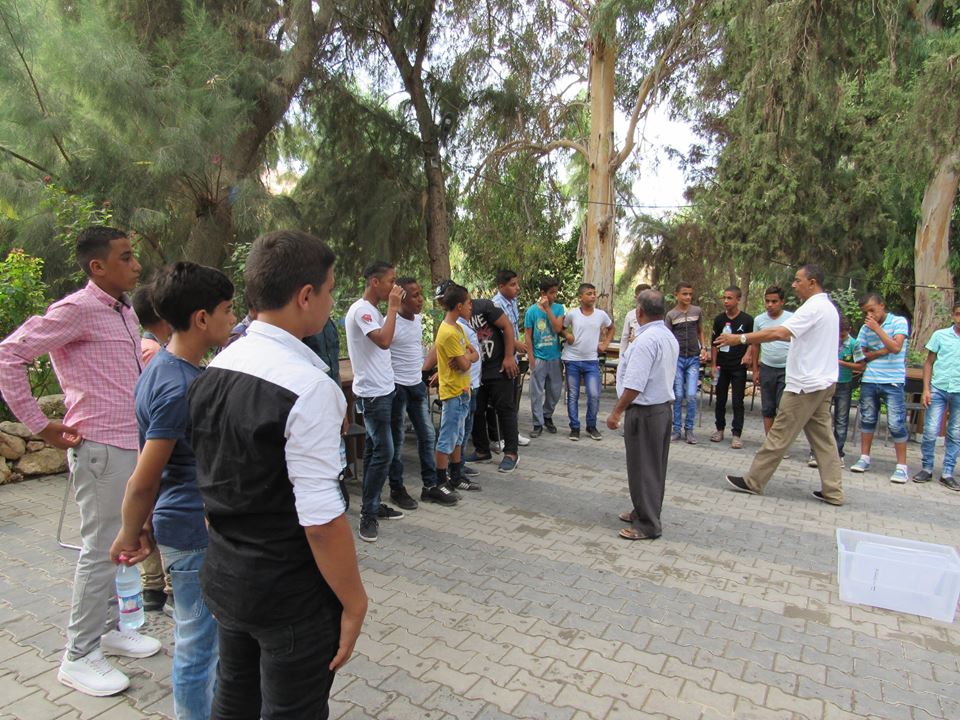 WRAP and its partners recently held a WASH and water harvesting training with children ages 14 to 16 at the Sharhabil bin Hassaneh EcoPark in Jordan.
WRAP and its partners recently held a WASH and water harvesting training with children ages 14 to 16 at the Sharhabil bin Hassaneh EcoPark in Jordan. 